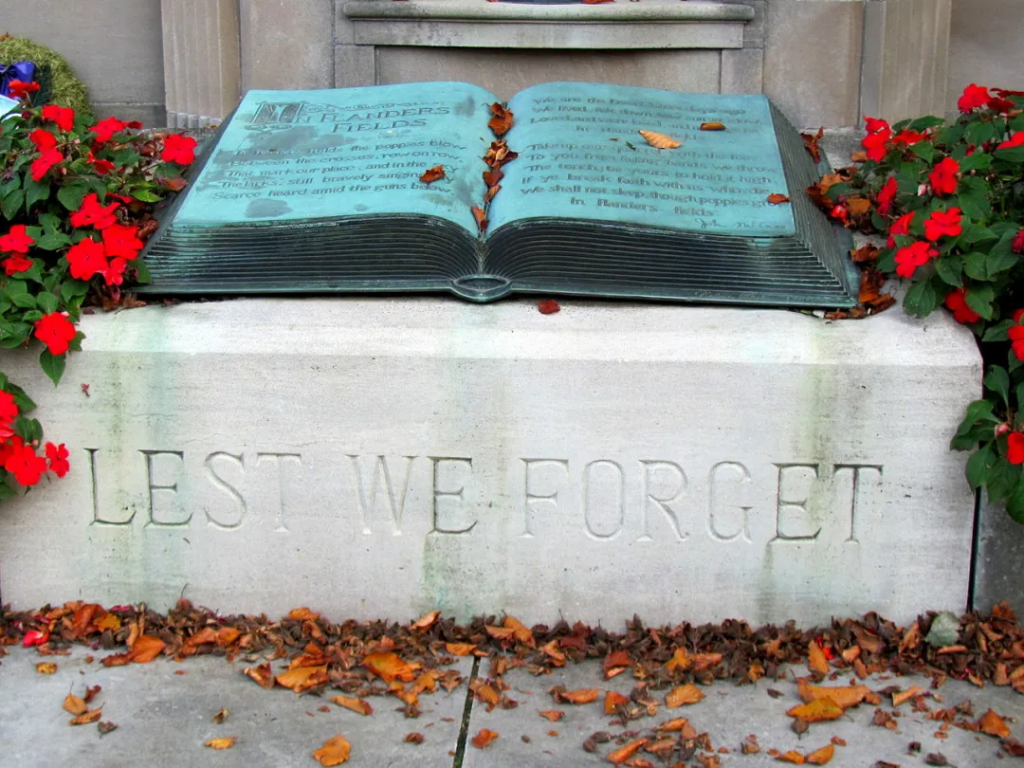
In Flanders fields the poppies blow
Between the crosses, row on row,
That mark our place; and in the sky
The larks, still bravely singing, fly
Scarce heard amid the guns below.
We are the Dead. Short days ago
We lived, felt dawn, saw sunset glow,
Loved and were loved, and now we lie,
In Flanders fields.
Take up our quarrel with the foe:
To you from failing hands we throw
The torch; be yours to hold it high.
If ye break faith with us who die
We shall not sleep, though poppies grow
In Flanders fields.
John McCrae’s “In Flanders Fields” is what I think about every Remembrance Day, so it seems to be the perfect time to reflect on this poem and what it stands for.
Growing up on Vancouver Island meant that this poem was a prominent part of Remembrance Day. As “In Flanders Fields” has become somewhat of a symbol of Canadian remembrance, the poem was read aloud every Remembrance Day ceremony. It was something that all of us students came to expect, and we used it as a tool to honour the fallen soldiers.
Before we discuss the meaning of this famous poem, we should delve into the man who wrote it, John McCrae.
John McCrae was born in Guelph, Ontario in 1872. He was enthusiastic about joining the military, and enlisted when he was just 17 years old, having been involved with the Cadet Corps since he was 14. While being interested in the military, he was also an avid poet, and he attended the University of Toronto on a scholarship.
McCrae went on to become the brigade-surgeon of the First Brigade of the Canadian Field Artillery during World War I. It was here where he penned the now famous poem “In Flanders Fields,” after seeing his friend killed. McCrae noticed the many graves surrounding the area where his men were stationed, and saw the famous red poppies growing upon their makeshift graves. “In Flanders Fields” was the second-to-last poem he would ever write.
“In Flanders Fields” was written to memorialize the millions of deaths from World War I, but it has come to signify the sacrifice of many others in later wars. Our wearing poppies as a symbol of our remembrance and respect for the fallen originated in this poem. Remembrance Day is all about honouring those who fought for our freedom, and John McCrae was one of those people.
For me, this poem is bigger than just a message to remember. “In Flanders Fields” represents a freedom that so many people were not fortunate enough to get. Every year I remember reading these words and thinking to myself, “I can’t even imagine what seeing this must have felt like.” John McCrae gives us a first-hand view of the devastation of war, yet still manages to notice the small beautiful poppies that mark the graves of his fallen fellow soldiers and friends. This imagery alone is enough to make us re-read the poem year after year, and the meaning it holds to so many people continues to show us it’s importance.
All of this being said, Remembrance Day is a time for us to reflect on the privilege we have and take a moment to consider what so many people gave up their lives for. So, if you haven’t done so already, I hope you take a moment to reflect and remember all those who laid down their lives for us.
Biographical information courtesy of poets.org and poetryfoundation.org.
Errin Johnston-Watson
This post was published on the original UVic ESA website.
Leave a Reply